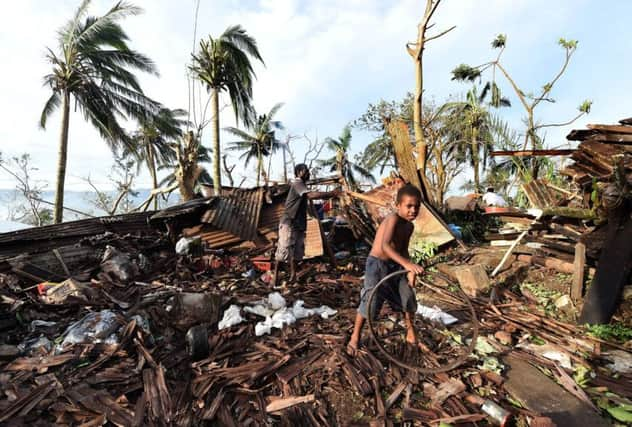Jack McConnell: Those in eye of the storm look to us


IN LATE 2013, the Queen’s Baton Relay – on its journey through every Commonwealth country to the Glasgow 2014 Games – spent Christmas Day in the Vanuatu Islands in the Pacific Ocean. Competitors from Vanuatu have never won a medal but their joy at coming to Scotland to participate was evident to all, especially the day they experienced snow for the first time on a visit to the Braehead arena.
Last week, these same islanders were visited by a very different event. Cyclone Pam tore through the islands, destroying homes, infrastructure and agriculture. Many died, many more are injured and years of development was blown away.
Advertisement
Hide AdAdvertisement
Hide AdImmediate humanitarian help is urgently required. Food, shelter and medical assistance will be provided through the international appeals launched this week. The international agencies and charities are much better these days at delivering help quickly and effectively, and co-ordinated appeals and action really do make our donations go far and fast. No doubt the UK – government and individuals – will be among those who give most again.
But the challenge will eventually turn to “build back better”. These increasingly frequent extreme weather events, happening all over the world, need preventative action that protects those populations most at risk and the schools, homes and roads that help them climb out of extreme poverty with opportunities to develop.
I have just returned from the Philippines. I was back for a second year as a Volunteer with VSO Bahaginan – the Philippines wing of VSO – to campaign with Beyond 2015 and support those locally fighting for justice and an end to extreme poverty. In particular, I wanted to go back to the communities devastated by Typhoon Haiyan whom I had visited in early 2014.
On my return to the island of Leyte, I was unsure what to expect. The island was the most affected by Typhoon Haiyan in November 2013 and on my last visit in February 2014, the population were still in shock. Beyond the main streets debris still covered land and buildings and huge ships thrown on to the beach at Tacloban remained as a reminder of the scale of the horror. Farmers were beginning to panic over the replacement of the 32 million coconut trees that were lost, and the need to feed their families and start to earn an income again over the seven years it would take for the trees to grow back.
Now, in Tacloban, the main town, commerce has returned. Shops and schools are open again. The airport has been reroofed and is no longer a shell. Everywhere I hear praise for the UK. Between government humanitarian aid and private donations, the UK was the single largest donor. Our contribution was fast and targeted important priorities.
In Tolosa, Sante Fe and Dulag, local farmers were able to tell me that the new homes built since 2013 withstood the three smaller typhoons in 2014; some crops planted last year survived those fresh onslaughts; and rebuilding of local schools was now under way.
However, in each of the three areas – the scale and speed of replanting, the number of new homes and access to vital services – there are concerns. The capacity of national and local government is strained, and much is still to be done.
For the longer term, the global community must take consistent action to slow down climate change and reduce the likelihood of extreme weather events. But we must also invest in disaster risk reduction and mitigation now.
Advertisement
Hide AdAdvertisement
Hide AdIn September 2015, the United Nations will agree new Sustainable Development Goals (SDGs) to succeed the Millennium Development Goals (MDGs). They will aim to end extreme poverty by 2030 and therefore we must go further than the MDGs set in 2000. The MDGs addressed urgent deficiencies in basic provision and set targets for primary schooling, clean water, vaccinations, and maternal health. In their time they were ambitious and they made a difference. But they avoided the most difficult and complex problems.
But in our world today, if we are to invest in programmes that transform the lives of the poorest and most vulnerable, the SDGs must prioritise climate change, conflict and inequality. And for places like Vanuatu and Leyte, they must lead to investment in disaster risk resilience and mitigation.
Extreme weather events not only destroy development already under way but they impact greatest on the most vulnerable. The SDGs must move beyond humanitarian aid in the event of natural disasters – admirable and important though those efforts are – to invest in Build Back Better, in early warning systems and in diversified and sustainable agriculture and infrastructure to provide the platform for sustained development in these disaster prone communities.
We must not forget Typhoon Haiyan, or the thousands who died. And we must not ignore Cyclone Pam. There is a real opportunity this year. Decisions made could transform the world over the next 15 years. We need tough targets to tackle climate change agreed in December. We need a strong commitment to disaster risk resilience in the SDGs in September. And back in Tacloban and the other communities of Leyte and Samar, we must not leave before the job is done.
The global community is helping to build back better, so now is not the time to move on, it is time to finish the job. The families who have suffered so much deserve nothing less.
• Lord McConnell spent ten days in the Philippines with VSO Bahaginan and Beyond 2015. He was first minister of Scotland 2001-07. vsointernational.org